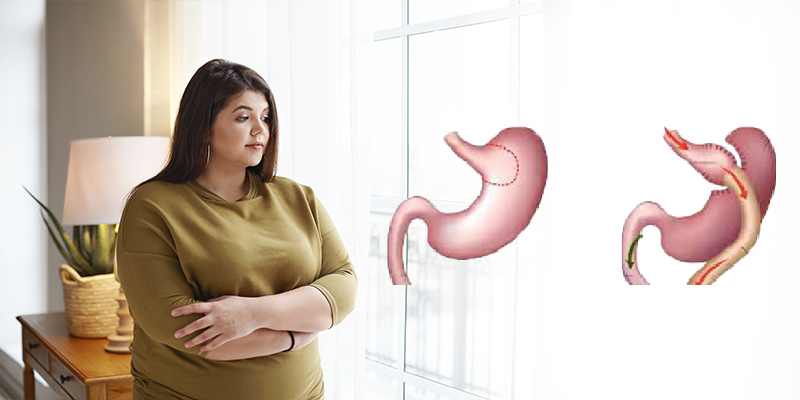
Estimated reading time: 4 minutes and 29 seconds
RNY Gastric Bypass
Operation and Postoperative Period
Roux-en-Y (RNY) Gastric Bypass, commonly referred to as gastric bypass, is considered the ‘gold standard’ of weight loss surgery and is the second most commonly performed method of bariatric surgery worldwide.
RYN Gastric Bypass involves the use of a small telescope-like camera inserted through a small incision in the abdomen and can be performed as laparoscopic surgery (minimally invasive) or as an open surgical procedure where a large midline incision is made in the abdomen. The laparoscopic method is currently the most commonly used and preferred by many surgeons. Although this method offers the advantage of faster recovery, not every patient may be the right candidate for this method.

RNY Gastric Bypass
What is RNY Gastric Bypass surgery, and how is it performed?
RNY Gastric Bypass surgery has two important stages. First, the upper part of the stomach is separated from the rest of the stomach, creating a small stomach pouch with a volume of about 30 millilitres. Next, the Y-shaped section of the small intestine is added to the pouch, allowing food to bypass the main stomach. By bypassing the two parts of the small intestine known as the duodenum and jejunum, the amount of calories and nutrients absorbed by the body is reduced.
The newly created stomach pouch after surgery is much smaller and can store less food at one time. This results in a lower calorie consumption, which accelerates weight loss. Most importantly, the redirection of the digestive process allows for a change for the better in gut hormones that increase satiety, suppress hunger and reverse one of the primary mechanisms by which obesity triggers type 2 diabetes.
After the Surgery
Since the digestive system changes and heals immediately after the operation, patients feel full very quickly after eating. RNY gastric bypass is one of the most effective weight loss methods and patients lose 60-70 per cent of their excess weight within the first 1-2 years after surgery.
The initial rate of weight loss will decrease over time. However, a healthy diet and exercise will help you lose weight in the future. On the other hand, decreasing your appetite and shrinking the stomach pouch will also contribute to less calorie intake. In addition to weight loss, most patients observe a great reduction in obesity-related health problems such as diabetes, high blood pressure, sleep apnoea and digestive problems after surgery.
Benefits
Roux-en-Y Gastric Bypass surgery offers numerous benefits for individuals struggling with obesity and related health conditions, including:
- Significant and sustainable weight loss
- Improvement or resolution of obesity-related health conditions such as type 2 diabetes, high blood pressure, and sleep apnea
- Enhanced quality of life and mobility
- Reduced risk of obesity-related complications such as heart disease and stroke
- Potential improvement in overall mental and emotional well-being
Recovery Process
The recovery process after the surgery typically involves several stages:
- Hospital Stay: Most patients remain in the hospital for 1-2 days following surgery for close monitoring and pain management.
- Diet Progression: Patients gradually progress from a clear liquid diet to a pureed diet and then to soft foods before reintroducing solid foods over the course of several weeks.
- Activity Level: Patients are encouraged to engage in light activity and walking soon after surgery to promote healing and prevent blood clots.
- Follow-Up Care: Regular follow-up appointments with the bariatric team are essential for monitoring weight loss progress, addressing any concerns or complications, and providing ongoing support and guidance.
Risks and Complications
While Roux-en-Y Gastric Bypass surgery is generally safe and effective, it carries some risks and potential complications, including:
- Infection
- Bleeding
- Blood clots
- Dumping syndrome (rapid emptying of the stomach contents into the small intestine)
- Nutritional deficiencies
- Gallstones
- Bowel obstruction
It’s important for patients to closely follow their postoperative instructions, attend all follow-up appointments, and notify their healthcare provider of any unusual symptoms or concerns during the recovery period.
Frequently Asked Questions
How much weight can I expect to lose with RNY Gastric Bypass surgery?
Weight loss varies depending on factors like starting weight, adherence to dietary and lifestyle changes, and individual metabolism. On average, patients can expect to lose about 60-80% of their excess body weight within the first 12-18 months post-surgery.
Will I need to take vitamin supplements after RNY Gastric Bypass surgery?
Yes, lifelong vitamin and mineral supplementation is typically required after the surgery. This is because the surgery alters the digestive tract, limiting nutrient absorption. Common supplements include multivitamins, calcium, vitamin D, vitamin B12, and iron.
Can RNY Gastric Bypass surgery be reversed if needed?
While technically possible, reversal of Roux-en-Y Gastric Bypass surgery is complex and not commonly performed. It involves extensive surgical intervention and carries significant risks. Reversal is usually considered only in exceptional circumstances, such as severe complications or medical necessity.
Will I need to follow a special diet after RNY Gastric Bypass surgery?
Yes, adopting a modified diet is crucial for successful outcomes after the surgery. Initially, patients follow a liquid diet, progressing to pureed and soft foods before reintroducing solid foods. Long-term, a diet rich in lean protein, fruits, vegetables, and whole grains is recommended, while sugary and high-fat foods should be limited.
How soon after RNY Gastric Bypass surgery can I resume normal activities, such as work or exercise?
The timeline for returning to normal activities varies for each individual and depends on factors like surgical complications, overall health, and the type of work or exercise. Generally, patients can expect to gradually increase activity levels over several weeks, with most able to return to work within 2-6 weeks and resume exercise after clearance from their surgeon.
How can Aktif International Hospitals help with RNY Gastric Bypass surgery?
At Aktif International Hospitals, our multidisciplinary team of bariatric specialists provides comprehensive care and support for patients undergoing RNY Gastric Bypass surgery. From preoperative education and counseling to personalized surgical treatment and postoperative care, we are committed to helping patients achieve their weight loss goals and improve their overall health and well-being. If you’re considering RNY Gastric Bypass surgery, schedule a consultation with us to learn more about your options and take the first step towards a healthier, happier life.
Author: İbrahim Ağaçkıran
For more information about this surgery, please visit the websites of our doctors listed below:
Mehdi Deniz – RNY Gastric Bypass
İbrahim Ağaçkıran – Roux-en-Y Gastric Bypass


 TR
TR FR
FR ES
ES RU
RU RO
RO